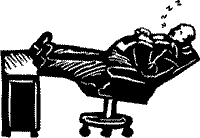 Sleeping is something we don’t usually think much about, but if you could do something to convert just 90 minutes of each day from sleep time into productive time, that would give you an extra 10 hours each week.
Sleeping is something we don’t usually think much about, but if you could do something to convert just 90 minutes of each day from sleep time into productive time, that would give you an extra 10 hours each week.
Steve Pavlina discovered that he could reduce the amount of sleep he required by an average of 90 minutes each day by getting up at 5 am 7 days per week. He only goes to bed when he is tired enough that he will immediately fall asleep. You can find more about his experience here and here.
Polyphasic sleep is a drastic method of changing your sleeping schedule. Basically, you try to train your body to enter deep sleep immediately by taking a 20 to 30 minute nap every 4 hours. In this way you only require 2 hours of sleep per day. For most people, this would translate into an extra 40 hours per week. Lifehack has some comments on an article by someone who uses this sleeping method.
Of course, even if you can get by with less sleep, there may be other harmful side effects. An article in Nutrition Action Health Letter (Jul/Aug 2005, Vol. 32 Issue 6) discusses some research from Europe into the causes of obesity in children. The researchers expected to find a link between the amount of time children spent in front of the television and obesity. Instead, they found that children who slept less weighted more. Another study in Wisconsin of middle-age government employees found a similar correlation.
Several people who are using the polyphasic sleep method mentioned that they require a lot more food. It seems reasonable that the body would need more food if it is more active, but polyphasic sleep could impede the body’s ability to regulate it’s own weight.
It is interesting to note that there seems to be very little research into polyphasic sleep. It has also been called Uberman’s sleep schedule and Dymaxion sleep. If you do a search through scientific journals, you’ll find many references to polyphasic, but very few of them are talking about fully replacing our regular sleeping pattern with 4 hour phases. Most of the time they are just referring to taking a several naps in addition to the main time you sleep.
One of the main people that has written about this type of sleep is Claudio Stampi. In particular, he wrote a book called “Why We Nap”. It sells for $155 on Amazon, so it isn’t something you can just pick up from your local bookstore. If anyone knows of some good research regarding this method of sleeping (especially how it impacts your health), please leave a comment.
Other random pieces of related info:
There was a study done on truck drivers printed in Biological Rhythm Research 2003, Vol 34, that talks about polyphasic sleep. In that research, they found evidence of a natural rhythm lending to taking several naps during a day. They also mentioned that if the naps are irregular, it could throw off the body’s sense of timing.
The November issue of Scientific American mentions unpublished research where a drug known as CX717 was able to improve the performance of sleep deprived humans. Previously the drug was given to sleep deprived monkeys. The monkeys were then given memory tests (which usually degraded with lack of sleep). With the drug, the sleepy monkeys were able to perform at the same level as well rested monkeys. However, when the drug was given to rested monkeys, they performed better on the memory tests, so the drug may be more related to improving memory than to suppressing the need for sleep.
Arshad Chowdhury of Metronaps is trying to cash in on people people who need more sleep. He invented a “sleep pod” that you can pay $14 to take a 20 minute nap. At the end of 20 minutes the pod vibrates to wake you up. The pods have a type of dome to cover your head and he has them installed in the Empire State Building and the Vancouver Airport. The Metronap pods might be the perfect thing for someone who wants to try to use the polyphasic sleep method, but don’t have an office area where they can take the required short naps during the day.
Originally published October 20, 2005.
Check out http://www.pzizz.com/ for an outstanding shortcut to faster, better naps. This software really works. (I’m not a developer, just a satisfied customer.)
Biphasic sleep might also be an option. I’m trying it out and it has been a great success until now – I’m now on day 10 and have managed to go from 7 to 4,5 hours of sleep per day.
I’m writing a bit about my sleeping adventures here:
http://phikamphon.com/category/sleeping/
Steve Pavlina also said that he won at blackjack helped by spirits of dead people (http://www.stevepavlina.com/blog/2008/08/can-spirits-help-you-win-at-gambling-a-las-vegas-field-test/), so I would be cautious on all the polyphasic experience…
Wow. I hadn’t seen that. I wonder if it was a story to try to get Google traffic for “Blackjack”. Of course if that is the case, it makes you doubt the whole polyphasic sleep story.